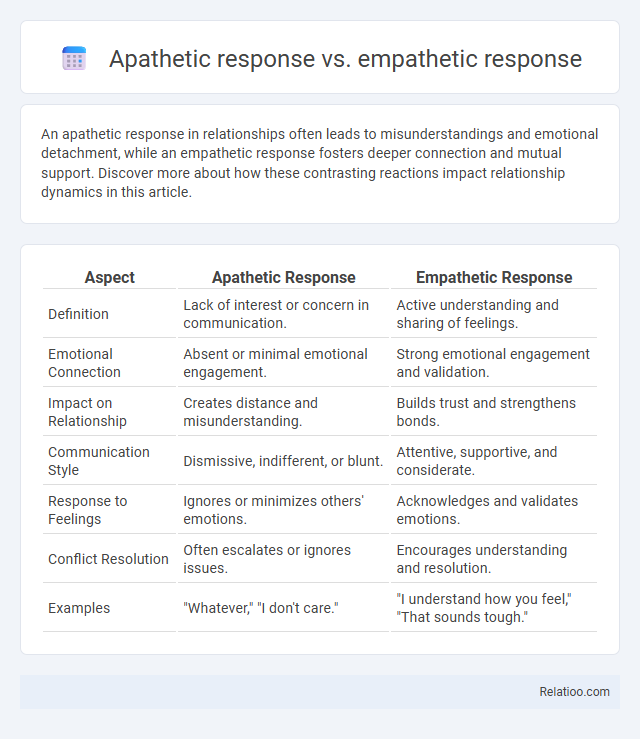An apathetic response in relationships often leads to misunderstandings and emotional detachment, while an empathetic response fosters deeper connection and mutual support. Discover more about how these contrasting reactions impact relationship dynamics in this article.
Table of Comparison
| Aspect | Apathetic Response | Empathetic Response |
|---|---|---|
| Definition | Lack of interest or concern in communication. | Active understanding and sharing of feelings. |
| Emotional Connection | Absent or minimal emotional engagement. | Strong emotional engagement and validation. |
| Impact on Relationship | Creates distance and misunderstanding. | Builds trust and strengthens bonds. |
| Communication Style | Dismissive, indifferent, or blunt. | Attentive, supportive, and considerate. |
| Response to Feelings | Ignores or minimizes others' emotions. | Acknowledges and validates emotions. |
| Conflict Resolution | Often escalates or ignores issues. | Encourages understanding and resolution. |
| Examples | "Whatever," "I don't care." | "I understand how you feel," "That sounds tough." |
Understanding Apathetic and Empathetic Responses
Understanding apathetic responses involves recognizing a lack of emotional engagement or concern, where the individual shows indifference to others' feelings or situations. Empathetic responses, in contrast, demonstrate the ability to comprehend and share another person's emotional experience, fostering connection and support. Your ability to distinguish these responses enhances interpersonal communication and emotional intelligence, improving relationships and conflict resolution.
Key Differences Between Apathetic and Empathetic Reactions
Apathetic responses exhibit indifference and lack emotional engagement, often showing no concern for others' feelings, while empathetic responses demonstrate understanding, compassion, and emotional connection to another's experience. You can identify empathetic reactions by active listening, validating emotions, and offering support, contrasting sharply with apathetic reactions characterized by disengagement and minimal emotional investment. Recognizing these key differences enhances communication effectiveness and fosters stronger interpersonal relationships.
Psychological Roots of Apathetic Responses
Apathetic responses stem from psychological roots such as emotional numbing, learned helplessness, and defense mechanisms that protect against overwhelming stress or trauma. In contrast, empathetic responses arise from emotional attunement, perspective-taking, and genuine concern for others' feelings. Understanding these differences can help you recognize when apathy is a psychological barrier rather than simple indifference, fostering more effective emotional engagement.
The Science Behind Empathy
The science behind empathy reveals distinct neurological pathways differentiating empathetic responses from apathetic ones, with empathy engaging mirror neurons and the limbic system to facilitate emotional resonance and perspective-taking. Empathetic responses involve activation in brain regions such as the anterior insula and anterior cingulate cortex, enabling individuals to understand and share others' feelings. In contrast, apathetic responses show reduced neural activity in these areas, reflecting emotional disengagement and diminished social bonding capacity.
Real-Life Examples: Apathetic vs Empathetic Behavior
In a real-life scenario, an apathetic response may involve ignoring a coworker's distress about missing a deadline, showing indifference to their struggle. An empathetic response, however, actively acknowledges their frustration and offers support or solutions, fostering connection and collaboration. Understanding these distinctions highlights how empathetic behavior enhances workplace morale while apathetic behavior can lead to isolation and decreased team productivity.
Impact on Relationships: Apathetic vs Empathetic
An apathetic response often leads to emotional distance and weakened trust in relationships by showing indifference to others' feelings. In contrast, an empathetic response fosters understanding, connection, and emotional support, strengthening bonds and promoting open communication. Your ability to respond empathetically directly enhances relationship satisfaction and resilience.
Emotional Intelligence and Response Types
Empathetic responses reflect high emotional intelligence by recognizing and validating others' feelings, fostering trust and effective communication. Apathetic responses, characterized by indifference or lack of emotional engagement, hinder relationship building and diminish social connection. Understanding the distinction between empathetic and apathetic responses is crucial for developing adaptive interpersonal skills and enhancing emotional awareness in both personal and professional contexts.
Strategies to Shift from Apathy to Empathy
Shifting from apathy to empathy involves actively practicing perspective-taking and emotional engagement to connect with others' experiences. You can develop empathetic responses by cultivating curiosity about others' feelings and asking open-ended questions that encourage deeper sharing. Consistent mindfulness and reflection on personal biases further enhance your capacity to move beyond indifference toward genuine understanding and compassion.
The Role of Culture in Shaping Responses
Cultural norms heavily influence apathetic and empathetic responses, shaping how individuals perceive and express emotions in social interactions. Collectivist cultures tend to foster empathetic responses through shared emotional experiences and social harmony, while individualistic cultures may exhibit more apathetic responses due to emphasis on personal boundaries and autonomy. Cross-cultural studies reveal that understanding these cultural variations is essential for effective communication and emotional intelligence in diverse settings.
Building Empathetic Communication Skills
Building empathetic communication skills requires recognizing the subtle differences between apathetic and empathetic responses. An apathetic response shows indifference or lack of concern, often hindering meaningful connection, while an empathetic response demonstrates genuine understanding and emotional alignment with others' experiences. Developing the ability to listen actively, validate feelings, and express compassion enhances trust and fosters stronger interpersonal relationships.

Infographic: Apathetic response vs Empathetic response
 relatioo.com
relatioo.com